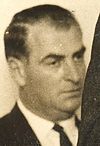1962 Waitaki by-election
| |||||||||||||||||||||
| Turnout | 14,022 (77.80%) | ||||||||||||||||||||
|---|---|---|---|---|---|---|---|---|---|---|---|---|---|---|---|---|---|---|---|---|---|
| |||||||||||||||||||||
| |||||||||||||||||||||
The Waitaki by-election 1962 was a by-election held in the Waitaki electorate in South Canterbury and North Otago during the term of the 33rd New Zealand Parliament, on 10 March 1962. The by-election was won by Alan Dick.[1]
Background
[edit]The by-election was caused by the death of incumbent MP Thomas Hayman of the National Party on 2 January 1962.[2]
Candidates
[edit]- Labour
The Labour Party selected trade unionist Sir Basil Arthur as their candidate. In 1960 he had stood in the Hamilton electorate.[3]
- National
There were several names put forward as potential nominees for the National Party candidacy:[4]
- Norman Stanley Brown, a farmer from Totara Valley and past president of the Waimate branch of Federated Farmers
- Alan Dick, a company director and chairman of the Tekapo Town Planning Commission
- Donald James Hulston, a farmer from Waihao Forks
- Bill Laney, a teacher and Mayor of Oamaru
- Derek Quigley, a farmer at Waipara who was National's candidate for Sydenham in 1960
- William Brown Trotter, a farmer from Fairlie
Dick was chosen to contest the seat.[4]
- Social Credit
The Social Credit Party selected Alfred William Barwood as their candidate. Barwood was director of two companies (a Fairlie-based transport company and the McKenzies Lime Works). He was president of Social Credit's Fairlie branch and vicepresident of the Waitaki electoral committee. He had contested the seat Waitaki seat in 1960.[4][5]
Results
[edit]The following table gives the election results:
| Party | Candidate | Votes | % | ±% | |
|---|---|---|---|---|---|
| National | Allan Dick | 6,359 | 45.49 | ||
| Labour | Sir Basil Arthur | 5,957 | 42.61 | ||
| Social Credit | Alf Barwood | 1,664 | 11.90 | ||
| Majority | 402 | 2.88 | |||
| Informal votes | 42 | 0.30 | |||
| Turnout | 14,022 | 77.80 | |||
| Registered electors | 18,023 | ||||
| National hold | Swing | ||||
The National Party initially retained the seat with a substantially reduced majority with a majority of only 320. With an estimated 1000 special votes still to be counted, this put the result in doubt.[7] In the official count National raised the majority slightly to 402 votes.[8]
Notes
[edit]- ^ Wilson 1985, p. 192.
- ^ Wilson 1985, p. 204.
- ^ "Waitaki Seat – Baronet For Labour". The Press. Vol. CI, no. 29745. 12 February 1962. p. 10.
- ^ a b c "Waitaki Seat – Tekapo Farmer to Stand". The Press. Vol. CI, no. 29743. 9 February 1962. p. 10.
- ^ "Social Credit Candidate – Mr A. W. Barwood To Stand For Waitak". The Press. Vol. XCIX, no. 29284. 16 August 1960. p. 7.
- ^ Norton 1988, p. 377.
- ^ "National in Lead in Waitaki – 320 Majority With 1000 Votes To Come". The Press. Vol. CI, no. 29769. 12 March 1962. p. 10.
- ^ "Waitaki Seat – 402 Majority For National". The Press. Vol. CI, no. 29778. 22 March 1962. p. 12.
References
[edit]- Norton, Clifford (1988). New Zealand parliamentary election results, 1946–1987. Wellington: Victoria University of Wellington Department of Political Science. ISBN 0-475-11200-8.
- Wilson, James Oakley (1985) [First published in 1913]. New Zealand Parliamentary Record, 1840–1984 (4th ed.). Wellington: V.R. Ward, Govt. Printer. OCLC 154283103.


